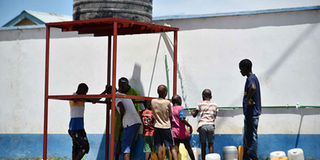In Coast, some think Covid-19 is rich folks’ disease

Mombasa County government makes water available to residents at Tononoka grounds on March 23, 2020, as war on coronavirus continues. PHOTO | FILE | NATION MEDIA GROUP
What you need to know:
- At the Likoni channel, hundreds of commuters are still forced to queue in lines that stretch up to two kilometres on the mainland.
- A spot check at the Mwatate and Voi bus stations revealed that the terminal are still congested and people don’t wear masks.
The Coast region is home to at least two Covid-19 hotspots. With 61 confirmed cases, Mombasa County is only second to the capital Nairobi (206) in the number of confirmed cases.
Neighbouring Kilifi is third with 10. With this worrying statistics, you would expect that residents would take seriously measures outlined by the Health ministry to help reduce new infections.
But the situation on the ground is different, spot checks by the Nation have revealed. There is little adherence to rules on social distancing, handwashing and wearing of face masks.
Matatus still carry passengers at full capacity. At Mombasa’s Tononoka market, traders go about their normal business without masks.
Some use handkerchiefs to cover their noses and mouth while those who have them wear them incorrectly — pushed down the chin or up the forehead.
When we visited, a group of women selling bananas, tomatoes and carrots sat huddled together. There were no handwashing areas for traders and their clients.
The situation in most residential estates is equally worrying. During the day, some parents allow their children to walk out of their houses and roam about the streets without the protective gear.
“We don’t have masks for children, the manufacturers should make one fit for this special group,” said Mr Philip Nzenge, an official at the children’s department.
RULE VIOLATED
At the Likoni channel, hundreds of commuters are still forced to queue in lines that stretch up to two kilometres on the mainland.
Coast regional Coordinator John Elungata, Governor Ali Hassan Joho, and County Commissioner Gilbert Kitiyo have expressed concerns over the breaching of Covid-19 rules.
“I have seen locals wearing their masks on the neck or chin only to put them on when they see police officers,” said Mr Joho.
In Taita-Taveta County, a spot check at the Mwatate and Voi bus stations revealed that the terminal are still congested and people don’t wear masks.
It is also business as usual for boda-boda operators, with some carrying more than one passenger without masks.
At markets, only a few traders and buyers wear masks. In Tana River County, market days are as busy as ever.
Garsen market, for instance, hosts about 30,000 people in a single market day. Residents told the Nation that the virus is “far away” and nowhere near them.
Government officials have become objects of public ridicule as they battle to enforce the law, with locals dismissing them and even calling them names.
SUPPLY SHORTAGE
In Hola, for instance, Chewani Chief Athman Mtolee said locals were defiant and were it not for the police, they wouldn’t pay heed to him at all.
“We get insulted in the villages. Our people are of the idea that this is a disease for foreigners and people who travel abroad. They are actually making jokes about it,” he said.
Boda-boda operators in the town were singled out as the most notorious in flouting the regulations, followed by miraa traders and youths playing pool games. Resident James Michuki said locals have learnt nothing from the mistakes of other countries.
In Tsunza village, Kwale County, which is near hard-hit Miritini in Mombasa, boda-boda operators and youth still hang out in groups.
Shopkeeper Shaban Chigamba, at the Mikanjuni market, said although he has placed a handwashing point close to his business, social distancing is a problem.
Boda-boda operators in Lutsangani routinely carry more than one and don’t wearing masks. “There are no masks in the village. Some people are covering themselves with home-made ones,” said resident Ali Mnyika.
The community, he said, has not been properly educated on the virus.
Reporting by Diana Mutheu, Mishi Gongo, Mohamed Ahmed, Lucy Mkanyika, Fadhili Fredrick and Stephen Oduor.




